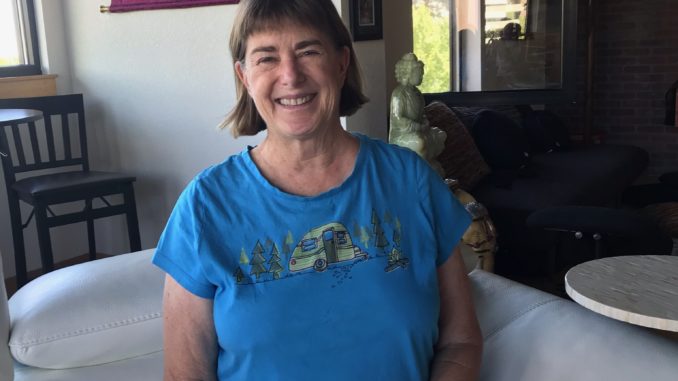
by Libby James
photo by Libby James
Meg Small of Fort Collins agreed not shower or wash her hair for a week before she joined a group of 12 to spend four days and nights living on the streets of Washington DC. In her own words, the group was there to “bear witness to, and open our hearts and minds to the lives of those living on the sidewalks in Washington DC in May 2019.”
A practicing Buddhist for nearly 30 years, Small, who has a masters degree in business and an undergraduate degree in music, has had a diverse career. She spent 15 years at Hewlett Packard, held an administrative position at Colorado State University’s Veterinary Medical School, and spent two years in the Peace Corps in the Ukraine. She has also worked as an international business consultant.
Today she is in her second year as part of a Chaplaincy Program operated by the Upaya Buddhist Center in Santa Fe. The program addresses a variety of issues among them the environment, empowering women, social justice and racial differences, hospital chaplaincy and death and dying. She is currently working on a major paper on polarization, as part of the program. And she is completing another requirement: 100 volunteer hours spent in an unfamiliar environment. She has spent many hours volunteering at the Murphy Center in Fort Collins.
Being a social activist is healing for Small and helps her face down personal neuroses. She is quick to admit that the four days and nights she spent on the streets of Washington DC were physically exhausting. Yet she wouldn’t trade the experience because of all she learned through living as a homeless person, and observing and interacting with the homeless she met on the streets.
The group spent their days searching for food and bathrooms, seeking shade, and collecting enough cardboard from dumpsters for the 12 of them to sleep, hopefully in an area with some protection from the rain. Temperatures were in the 80s with high humidity. Their sleeping spot was noisy, brightly lit and haunted by rats and cockroaches. One gracious homeless woman tried to lure the creatures away by scattering pieces of her sandwich a short distance away from the area.
Small was surprised by the generosity and kindness displayed by the homeless who shared what little they had with each other. She also noticed how invisible they were to the professionals who passed by, protected by earplugs and avoiding eye contact or even a nod. Small found herself in need of a $2 metro ticket to join up with her group. She had no luck when she tried to get someone in Union Station to help her out.
Each person in the group was allowed to bring one blanket, a backpack, a single ID, no credit card, no change of clothes, one old poncho or garbage bag for protection from rain, and one dollar. Not allowed: credit cards, wallets, toothbrushes or any personal hygiene items.
Participants learned how uncomfortable it is to ask people for money for personal reasons. Before they left home, each person in the group was charged with raising money that was then donated to the organizations that provided the food they ate during their time on the streets. The group was totally honest with the homeless people they met, explaining that they were not homeless themselves but were activists voluntarily living on the streets committed to learning what it was like to be without permanent shelter. The homeless, Small discovered, were gracious and willing to share with them the best places to find food, toilets and shelter.
Every day the group came together in the park to meditate and share with each other. Strangers at the beginning, they soon became a tight group, grateful for each other and for the moments of peace and quiet they spent in the park.
When her self-imposed homelessness was over, Small said she felt strangely disoriented as she returned to her familiar world. “I was like a stranger in a strange land, she said. The organizer of the group advised her to “Let this experience cook. It will change you over time.”
She came home exhausted but energized to contribute to ending homelessness in Fort Collins. “We have 430 homeless here,” she explained. “That is not a huge number. It’s a solvable problem.” Quoting David Rout, executive director of Home Alliance at a Toast to Transitions event in June 2019, Small shared his words. “Multiple organizations in Fort Collins have done a great deal to develop targeted, well-constructed and well-executed plans aimed at making homelessness rare, short-lived and non-recurring in Fort Collins. We know who is homeless, why they are, and the interventions that work to help them. Progress has been made helping people escape chronic homelessness and move toward self-sufficiency. If we can do this for some, why can’t we do it for everyone?” Rout asks.
With committed activists like Meg Small at work, homelessness may soon become a rarity in Fort Collins.
Support Northern Colorado Journalism
Show your support for North Forty News by helping us produce more content. It's a kind and simple gesture that will help us continue to bring more content to you.
BONUS - Donors get a link in their receipt to sign up for our once-per-week instant text messaging alert. Get your e-copy of North Forty News the moment it is released!
Click to Donate
